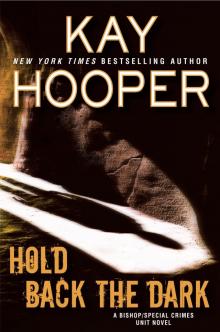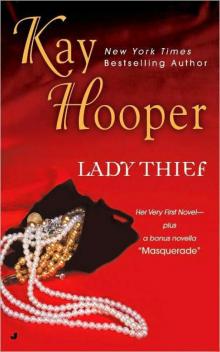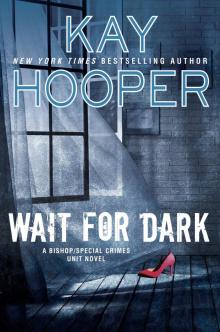- Home
- Kay Hooper
In Serena's Web Page 4
In Serena's Web Read online
Page 4
Since it was obviously a rhetorical question, Brian didn’t bother to respond to it.
“I want you, Brian.”
The soft words went through him like a hot knife, burning and hurting, and he found his eyes locked with her wistful gray ones. In that moment Brian understood fully and completely just how dangerous Serena Jameson really was. Because nothing mattered. When she looked at him, nothing mattered but the ravenous need she could ignite with a few soft words and a glance.
“You want Long,” he said hoarsely.
She smiled. “Right now I want you.”
Brian rose to his feet, and every part of his body protested because he was going to leave her.
“You don’t need to learn a damn thing about seduction,” he told her. “You’ve got it down pat.”
THREE
SOMEWHAT TO BRIAN’S surprise, Serena had no date with Long for dinner that night. Instead she knocked on his door and sweetly invited him to dine with her.
For a moment Brian was unable to answer, since he was busy wondering if it was a physical impossibility for the human heart to turn flips like a landed fish. When he was finally able to accept her invitation, he was unsurprised to hear the hoarseness of his own voice.
She was wearing a silver gown that had been designed with a creative flair and a total ignorance of the laws of gravity. It was backless to the flare of her hips, strapless, and the long skirt was slit up the side almost to her hip. Material that looked like nothing so much as a gossamer silver web—appropriate, he thought dimly—clung to her slender body to emphasize every curve, every hollow … and every breath she drew.
They were in the elevator descending to the lobby when he had a very belated realization. “Dammit, you’re starting.”
“Starting what, Brian?”
Another guest was in the elevator, and Brian only just managed not to blurt out what she was starting. Instead he contented himself with glaring at her briefly, then turning the glare on the stranger, who was staring at Serena. Encountering that stony gaze, the stranger hurriedly looked away.
Serena slipped her hand into the curve of his elbow and smiled up at him. “You have a nasty, suspicious mind,” she told him placidly. “I’m just taking this opportunity to wear some of the gowns I bought in Paris.”
“Is that what that is?” he questioned rather grimly. “A gown?”
“What did you think it was?”
“Ammunition.” Under his breath, he muttered. “Why aren’t you shooting at Long?”
“Brian, you’re being cryptic. I’m not shooting at anybody at all.”
Very conscious of her hand on his arm, Brian led the way through the lobby and into the restaurant. And he wasn’t at all surprised to see heads turn and eyes widen as Serena preceded him to follow the waiter to their table. He also saw Long seated a few tables away from them. With a gorgeous blond companion.
Serena didn’t appear to notice.
“You are shooting at him,” Brian noted evenly the moment their waiter left. “Or at his date.”
“I think I’ll have the chicken,” Serena murmured, gazing at the menu thoughtfully. “It sounds good. What about you, Brian?”
He was still wondering at her motives. “Trying to make him jealous? Or the blonde rabid?”
“Why don’t we have wine?”
“Serena.” He waited until tranquil gray eyes lifted to his. “Dammit, which one of us is it tonight?”
She folded the menu and leaned forward slightly, her hand reaching to cover his clenched one. “Brian,” she said softly, infusing his name with the sound and flavor of an endearment, “you’re the only man in the room.”
He knew—he knew—that she was doing it deliberately. But for some inscrutable reason that knowledge did nothing to slow his racing pulse. Carefully reclaiming his hand, he fixed his gaze on his menu and muttered, “You’re a threat to mankind.”
Serena sat back and laughed, but made no comment. Instead she began to talk in the easy, companionable manner she had during the last three weeks. Brian, somewhat relieved, responded as best he could while striving to keep his gaze off her enticing décolletage.
A very sane and analytical part of his mind recognized that it was totally absurd for an experienced man of thirty-six to feel as callow as a smitten schoolboy in this woman’s admittedly seductive presence. That same portion of his mind also questioned the validity of intelligence quotient tests; his I.Q. supposedly qualified him as highly intelligent.
Odd how quickly intelligence could desert a man.
For her part Serena was her normal sweet, tranquil self. She made no further remarks Brian could have called suspicious, nor did she flirt with him. She talked quietly and casually, and it wasn’t until dessert had been set before them that a warning bell rang in Brian’s head.
“I’m sorry—what did you just say?” he asked cautiously.
Guileless eyes smiled at him. “I said that the Bishops are going into the city tomorrow afternoon, and I promised to watch the kids for them.”
He took a deep breath. “Who are the Bishops, and how many kids did you promise to watch?”
“Brian, I’m sure you’ve seen the Bishops. They’ve been staying here as long as we have. They’re the couple down the hall from us with the little boy and girl.”
He remembered. He remembered two tow-headed kids of about six and eight years old who looked like angels and behaved like creatures possessed by mischievous demons. The hotel staff already went in terror of the little monsters.
Those two … with Serena?
Brian looked down at the delicious-looking strawberry shortcake before him, and pushed the dish away with a sigh. He’d lost his appetite. He couldn’t imagine why.
She giggled suddenly. “You don’t have to help, Brian; I can take care of the kids myself. And it’s only for a few hours.”
“Wars,” he noted, “have begun and ended in a few hours. Rena, do you have to do this?”
“I promised.”
“Did the Bishops ask you?” He knew the answer.
“No, but I knew they hadn’t had much chance to be alone together. They tried one of the hotel sitters once, but haven’t been able to get one since. They’re always busy.”
He saw the gleam of laughter in her eyes, and realized that Serena knew why the hotel sitters were all booked up when it came to the Bishop children. He sighed again. “Great. That’s just great. If I have to bail you and two kids out of jail, I know I’ll murder you.”
“You worry too much.” Serena had finished her own dessert under his unconsciously fascinated eye; she ate enough, he’d noticed, to feed three people, and never gained an ounce, that he could detect.
“I’ve been working on an ulcer,” he agreed dryly. “For about three weeks now.”
“Are you going to eat that?”
Silently he slid his dish across to her, and watched her dig in. “Where d’you put it?” he asked wonderingly, bemused.
Unoffended, Serena smiled at him. “Daddy says I have a peculiar metabolism. One of these days he plans to find out how it works so he can market the results and get rich.”
“He’s already rich.”
“Richer, then. Besides, he wants to win the Nobel Prize, and he figures that’ll do it.”
“You never talk about your mother.” He didn’t know why he brought that up, except that he was curious.
Serena didn’t respond for a moment, but then she pushed the half-eaten dessert aside and gazed at him steadily. “Mother was killed sixteen years ago.”
He returned her gaze, sensing more from her even tone than from the words that there was a larger story behind her mother’s death. His hand slid across the table to cover hers instinctively. “What happened?”
With her free hand Serena toyed with the stem of her wineglass. “It isn’t a matter of public record,” she said quietly. “It was listed as an accident. And it was that; they meant to get Daddy.”
“What?” An icy finger t
raced his spine.
“Mother was going shopping. She left the house and drove Daddy’s car; he’d had to take an emergency trip, so his car was there. She was just going shopping. We lived in the mountains, and the road into town was … one you had to be careful driving on. The police decided she’d just lost control on one of the curves. The car went over a cliff.”
Brian’s hand tightened on hers. “But you don’t believe it was an accident?”
“Daddy was with a government think tank at the time. Since he was working on some … some very special projects, they sent out an investigative team of their own. The local police had determined that the car’s brake line could have been severed in the crash, but the team didn’t agree. Somebody had thought Daddy was going to be in that car, and only an emergency summons from his group had saved him.
“They didn’t know if the group’s security had been compromised or if it had been just a matter of someone’s wanting to destroy a mind that couldn’t be bought. Anyway, a cordon of security was thrown around Daddy and me.”
“Did they find out who—?”
“No. Daddy was working in the field of physics then; it could have been any number of groups or organizations. Or countries.” She sighed softly. “A couple of years later Daddy told them what they could do with his security clearance, and went to find work in the private sector. And he changed fields; it wasn’t difficult for him. He went into engineering first, deciding it was a less-threatening area. Then he specialized in electrical engineering and computer technology. You know the rest.”
Brian sat in silence for a moment, thinking of the man he’d known for two years and—he realized now—barely knew at all. A tall, still-handsome man with graying hair and mild gray eyes. A man who spoke little about himself and less about his past.
“I never knew,” Brian murmured.
Serena’s gaze was far away. “He doesn’t talk about it. His love for Mother was very special. She’d been married before, very young, and her husband had died after only a few years. She and Daddy met a couple of years later. He loved her from the first. She was small and delicate, with the sweetest temper of anyone in the world. She was also wealthy—in her own right as well as by marriage. Daddy was working, making a name for himself, but not much money. It was another year before he got up the nerve to propose.”
She laughed suddenly. “Can you imagine? Daddy nervous?”
“It does seem out of character.” Brian smiled, but then, as the implications of what she’d told him sank in, he frowned. “Rena, even though he’s no longer so much of a target—at least I assume he isn’t—didn’t Stuart worry about your touring Europe alone?”
Serena seemed lost in the past again. “Of course he worried. Still does. But neither one of us could stand being fenced in for long. I wanted to see Europe; he understood that. He’d made a point to keep me out of the public eye. Since I’m not a newsworthy person, I’m as safe as anyone is in these troubled times.”
“Then why,” Brian said evenly, “did Stuart insist on having someone accompany you home from England?”
Her smile died, and Serena’s gaze dropped to the fingers still toying with her glass. After a long moment she said softly, “That project he’s doing for you, Brian—if it’s successful, it could change the way computers are designed and built. Yes?”
“Yes.” He was beginning to understand, and that icy finger traced his spine again.
“Well, I’m sure your security is excellent; otherwise Daddy would have told you. But there are a lot of companies, a lot of big names, scrambling to get on top in the computer industry. The next big thing. And a man of Daddy’s reputation working for an innovative company like yours—well, it could start people thinking.”
“Rena.” He stared at her, waited until she met his gaze. “What aren’t you telling me?”
Obviously choosing her words carefully, Serena said, “Daddy isn’t worried about my physical safety, Brian. I mean, hiring bodyguards would have been ridiculous, aside from defeating the purpose by calling attention to me. What was needed was just a leisurely, unplanned trip with a very loose itinerary. And he wanted me to have company, to be on the safe side—”
“Serena.”
She sighed. “He got a few calls, Brian, that’s all. A man’s voice. The caller didn’t say anything except the name of my hotel in Paris. Daddy alerted me; I changed hotels. The next day he got another call; my new hotel was named.”
“My God, Serena—”
Her hand turned beneath his to clasp it firmly. “Brian, Daddy’s lived with this kind of thing before. So have I. That caller just wanted him to know that I could be found if necessary. Daddy’s gotten a few very lucrative offers in the last months; he thinks one of those who has made an offer is behind it. Someone wants him, and badly. And that someone is warning him to think carefully before he refuses the next offer.”
Brian was no stranger to the concept of industrial spies, since he’d dealt with one or two in the ten years of his company’s existence, but this kind of quiet, dangerous maneuvering was beyond his experience. “You should be somewhere safe,” he muttered, his fingers tightening around hers.
“I am somewhere safe.” She smiled at him. “I’m moving from place to place on the map, quietly and with no fanfare. In a rented car on anonymous highways and scenic roads off the beaten path. Never in any one place long enough to leave a trail. And, what’s more important, I’m giving Daddy and his contacts time to follow their trail. When we reach California, Daddy will know who wants him so badly, and why. Once he knows, he’ll be able to deal with it.”
He didn’t, Brian realized dimly, know Stuart Jameson at all.
“Why,” he wanted to know, “wasn’t I told this from the start?”
Serena hesitated. “I’m sorry, Brian, but that was my idea. I didn’t know you, remember. And—to mangle a quote—I’ve never relied on the kindness of strangers. Or looked to strangers for protection. Daddy wanted it known you were traveling with me, and he sent you straight to London to give himself time to arrange things back here. When we reached New York we were registered at the hotel for four days—and left after two. They lost us after that; Daddy got a call placing me in New York, but they haven’t mentioned me in the two calls since.”
Shaking his head, Brian said incredulously, “Why me, for God’s sake? If he wanted it known you had a companion, why not at least one bodyguard? One unobtrusive bodyguard, with an unobtrusive gun or two?”
“I don’t like guns,” Serena said firmly. “And no matter how unobtrusive he tries to be, a bodyguard always looks like a bodyguard. And that provokes questions. ‘Why on earth d’you suppose the little lady needs a watchdog? Maybe she’s somebody the local paper would pay a few dollars to find out about.’ And so on. I’ve seen it happen. This way, all anyone knows is that I’m traveling with a very handsome man important enough to garner a few front-page headlines, whom my father happens to work for.”
Then, a suddenly mischievous glint in her eyes, she added blandly, “A man, moreover, who’s well known for his ability to take care of himself, and anyone else who rears a troublesome head. He’s athletic, has a black belt in karate, and is a licensed pilot capable of flying any and all private aircraft. He earned a few marksman’s medals in the army, where he distinguished himself remarkably for peacetime, by the way.”
Brian had a dim feeling his mouth was hanging open.
“His favorite color is blue,” Serena went on gently, “he drinks Scotch but prefers wine, takes his coffee black and strong, and loves Italian food and semiclassical music. He keeps his very nice condo neat without benefit of anything but once-a-week help, the leaning toward neatness possibly a holdover from the army but more likely the result of being raised by a Scots-Irish mother and a German-English father, who is presently a retired general who does the Sunday Times crossword in an hour flat.”
“Serena—”
“Their paragon of a son,” she finished innocently, “is
also adept at difficult crossword puzzles—and other kinds of puzzles—since he boasts an I.Q. that ranks him as something of a minor genius.”
“Minor—” He stared at her. “What’s your I.Q.?” he demanded abruptly.
“Same as yours,” she murmured.
Brian drew a deep, slow breath. “D’you mind telling me,” he managed to ask politely, “just where you got all that information about me? I don’t recall being asked to fill out a questionnaire.”
“Oh, here and there.”
“That’s no answer.”
“I asked Daddy.”
“Stuart’s never been to my condo, and he doesn’t know my favorite color. Try again.”
“Daddy. Seriously, Brian. He knows an awful lot that he doesn’t seem to know. And a man in his position, well … he found out all he could about you before he ever signed on; it’s habit, after all these years.”
Brian was trying manfully to grapple with all the surprising, disturbing information that had capped a deceptively peaceful meal. “Let me get this straight. Person or persons unknown intend to hire your father away from my company by fair means or foul. The ‘fair’ includes dollars on a scale I don’t want to ask about; the ‘foul’ includes possible kidnapping and/or bodily harm threatening yourself. Right so far?”
“That was just lovely. You do have a way with words,” she said admiringly.
Brian ignored the plaudits. “In an attempt to remove you from circulation, your father has sent you on a cross-country jaunt with me as watchdog, while he busily, heaven only knows how, tracks down these unknown people.”
“That sums it up nicely.”
“And—and—while all this is going on, while you are presumably safest moving from place to place, and while your father and his mysterious ‘contacts’ attempt to track down these equally mysterious people, while I’m being led by the nose down a blind alley filled with thugs, for all I know—” Under stress, Brian lost track of his sentence and hastily backed up to the point. “While all this is going on, you’re planning to stay here in Denver for at least three weeks? Stay in one place? The worst thing you could possibly do at the moment?”

 A Deadly Web
A Deadly Web Raven on the Wing
Raven on the Wing Always a Thief
Always a Thief Star-Crossed Lovers
Star-Crossed Lovers Blood Dreams
Blood Dreams Shades of Gray
Shades of Gray Rebel Waltz
Rebel Waltz Chill of Fear
Chill of Fear Sleeping With Fear
Sleeping With Fear After Caroline
After Caroline Time After Time
Time After Time Haunting Rachel
Haunting Rachel Hunting Fear
Hunting Fear Out of the Shadows
Out of the Shadows Whisper of Evil
Whisper of Evil Blood Sins
Blood Sins Hiding in the Shadows
Hiding in the Shadows C.J.'s Fate C.J.'s Fate C.J.'s Fate
C.J.'s Fate C.J.'s Fate C.J.'s Fate Fear the Dark
Fear the Dark Illegal Possession
Illegal Possession Stealing Shadows
Stealing Shadows If There Be Dragons
If There Be Dragons Once a Thief
Once a Thief In Serena's Web
In Serena's Web On Wings of Magic on Wings of Magic
On Wings of Magic on Wings of Magic Hostage
Hostage The First Prophet
The First Prophet Through the Looking Glass
Through the Looking Glass Golden Flames
Golden Flames Finding Laura
Finding Laura Haven
Haven The Haviland Touch
The Haviland Touch The Lady and the Lion
The Lady and the Lion Haunted
Haunted Velvet Ligntning
Velvet Ligntning Blood Ties
Blood Ties Adelaide, the Enchantress
Adelaide, the Enchantress The Matchmaker
The Matchmaker Golden Threads
Golden Threads The Haunting of Josie
The Haunting of Josie Rafferty's Wife
Rafferty's Wife Amanda
Amanda Hold Back the Dark
Hold Back the Dark Sense of Evil
Sense of Evil What Dreams May Come
What Dreams May Come Larger Than Life
Larger Than Life Enemy Mine
Enemy Mine Velvet Lightning
Velvet Lightning The Fall of Lucas Kendrick
The Fall of Lucas Kendrick Aces High
Aces High Captain's Paradise: A Novel
Captain's Paradise: A Novel The Wizard of Seattle
The Wizard of Seattle Lady Thief
Lady Thief Summer of the Unicorn
Summer of the Unicorn Outlaw Derek
Outlaw Derek Wait for Dark
Wait for Dark The Glass Shoe
The Glass Shoe It Takes a Thief
It Takes a Thief Zach's Law
Zach's Law Unmasking Kelsey
Unmasking Kelsey Hidden Salem
Hidden Salem